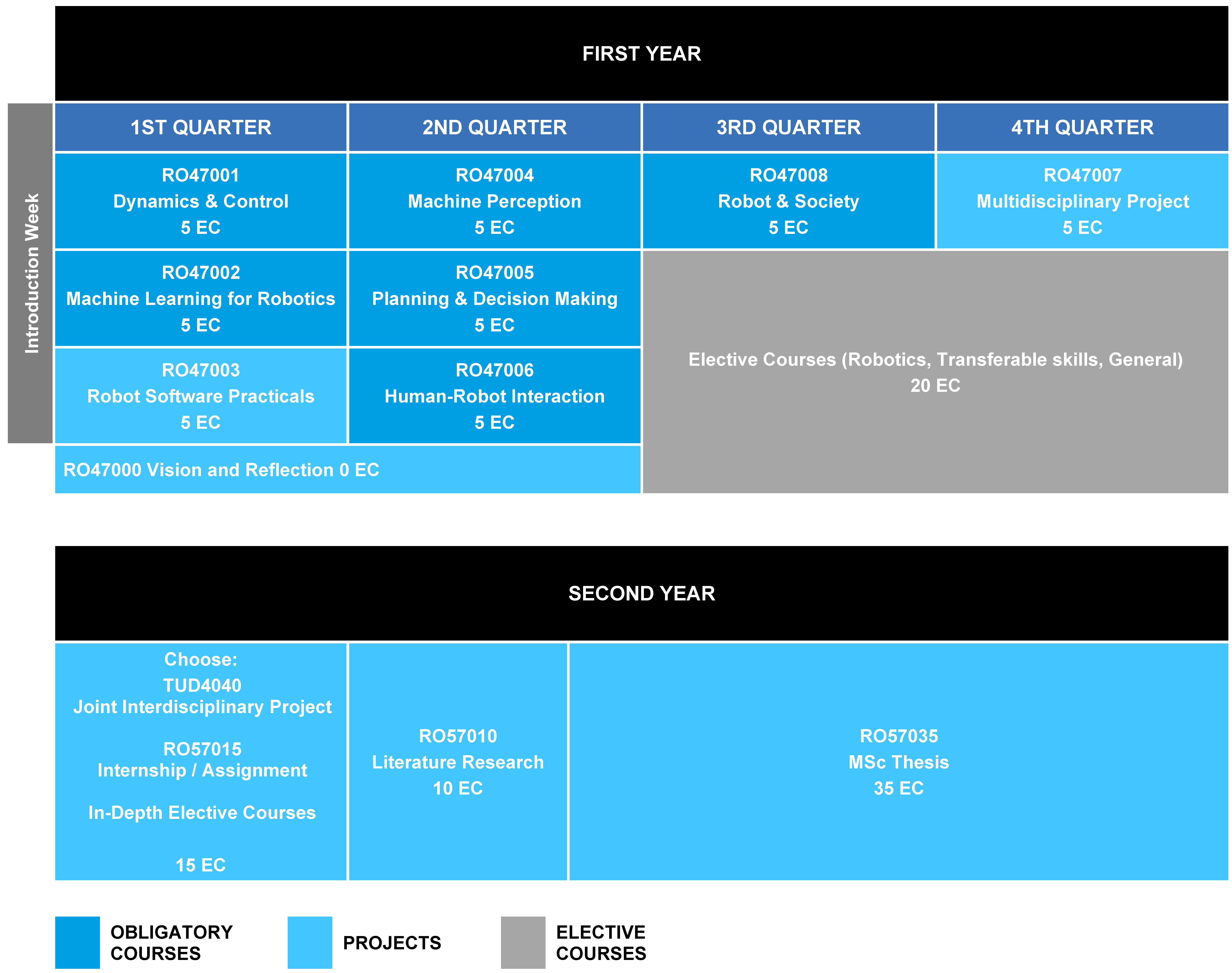Programme
The study programme consists of two years of study, each with a study load of 60 EC. The total Robotics programme is worth 120 EC.
More information
First year
The first year of the programme consists of eight obligatory courses for all Robotics students, with a total of 40 EC. The goal of these courses is to give all students a solid common background in Robotics. The courses are (1) Dynamics & Control, (2) Machine Learning for Robotics, (3) Robotic Software Practicals, (4) Machine Perception, (5) Planning & Decision Making, (6) Human-Robot Interaction, (7) Robots & Society, and (8) Multidisciplinary Project.
Second year
The second year of the programme consists of three elements:
- a project with focus on interdisciplinarity. Students can choose between an Internship / Assignment, a Joint Interdisciplinary Project, or in-depth elective courses (15 EC)
- Literature Research (10 EC)
- Thesis (35 EC)
The goal of the second year is to let students work on complex research problems both individually and in groups, apply the tools and methods taught in the first year, and develop new theories or design methods to solve complex mechanical engineering problems.
Vision and Reflection
Robotics engineers are expected to have more than just technical knowledge. They are also expected to have so-called transferable skills and an understanding of the role of robotics engineers in relation to society’s needs. In addition, robotics engineers must be able to reflect on their behaviour and that of others, and understand how their behaviour affects teamwork. Finally, robotics engineers must be able to communicate clearly and reflect on their choices and prospects.
The curriculum is designed in such a way that there are plenty of opportunities to gain reflective experiences. In addition,the course ‘Vision and Reflection’ (0 EC) is specifically aimed at developing transferable skills. It starts with an elevator pitch during the introduction week In Q2 students will work together in mentor groups and it ends with a vision presentation in the mentor group.
Room for own choices and development
In addition to the compulsory courses, students will choose electives (20 EC). Students have the freedom to make their own choices. The MSc Coordinator and the mentors will support students in making choices to draw up their Individual Student Programme. A number of elective courses have been put together by the Programme Management. These newly-created courses go into depth with respect to the obligatory courses and prepare the students for their MSc thesis.
Courses on Transferable Skills
Each student follows between 8 and 11 EC in courses on Transferable Skills: 5 EC out of the compulsory programme (Robots & Society) and between 3 and 6 EC as one or more elective courses.
Based on discussions with students and Robotics industry, the following knowledge is regarded as important: knowledge about logistics, cultural differences, regulations, production processes, sustainability, design, and economy/business. Furthermore, the following skills are regarded as important: project management skills, consultancy skills, and organisational skills.We encourage the Robotics student to select a course on Transferable Skills in one of these areas.
The programme starts formally in September. TU Delft students can administratively enroll at a later time during the year. However, the organisation is not obliged to offer a do-able programme to students who do not start in September.
In particular, the organisation is allowed to set specific entry requirements for a course. These requirements can be found in the study guide. The Multidisciplinary Project (Q4) relies on having the necessary programming skills (Robot Software Practicals, Q1). The course coordinator may reject students who do not meet the formal requirements.

